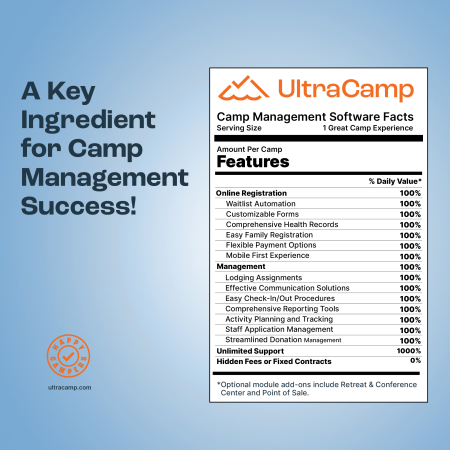Camp is a place for adventure, exploration, growth, and lasting memories.
Whether it’s a child’s first time at camp or they’re returning for another summer of fun, one thing remains paramount: their safety. Behind the scenes, background screening plays a pivotal role in creating a secure environment for campers and staff alike.
Why Background Screening Matters
Background screening isn’t about being skeptical; it’s about being responsible. According to the Professional Background Screening Association and The Sentencing Project, as of 2023, one in three adult Americans has a criminal record (Kumar, 2023). That’s right, one in three adult Americans. That means a criminal conviction, not merely traffic tickets. Background screening is your camp’s way of ensuring that the individuals entrusted with your campers’ care are trustworthy and safe.
Here’s how you can make the most out of this crucial process:
1. Start early and stay ahead.
Imagine this: it’s a week before camp begins and you’re still waiting for background check results. Avoid stress and last-minute hassles by initiating the screening process as you begin recruiting staff and volunteers. Starting early ensures you will have ample time to identify and address any potential issues.
2. Define clear criteria.
Every camp is unique, so it’s essential to define clear screening criteria that align with your camp’s values and objectives. Establish the characteristics or behaviors that disqualify an individual from working or volunteering at your camp. This ensures consistency in decision-making.
3. Tailor your screening packages.
Not all camp positions are equal. Work closely with your background screening provider to customize screening packages based on specific roles within your camp. Those working directly with children may require more extensive checks than administrative staff. Also, new background screening products may be available — such as social media searches — that may help your camp establish a cultural fit.
4. Secure informed consent.
Transparency builds trust. Always obtain written consent from individuals before conducting background checks. Ensure that they understand the purpose and scope of the checks and provide them with clear information about their rights during the process. Most background screening companies today allow background applications to be emailed or texted with built-in compliance features (such as the authorization and disclosure).
5. Partner with reputable providers.
Your camp’s reputation and the safety of campers and staff are at stake, so it’s crucial to partner with a reputable background screening provider. Do your due diligence to research their credentials, track record, and compliance with relevant laws.
6. Stay current with regulations.
Laws and regulations related to background checks are subject to change. Regularly review and update your screening policies to ensure that they comply with local, state, and federal requirements.
7. Institute periodic rechecks.
Even individuals with clean backgrounds at the time of hiring may develop concerning records in the future. Implement a policy for periodic rechecks of staff and volunteers to ensure that your camp remains a safe place over time.
8. Evaluate results with care.
Background check results are essential, but they aren’t the whole story. When results are available, review them thoroughly, considering any red flags or concerning information. Establish a process for reviewing results and making informed decisions.
9. Practice open communication.
Maintain open and respectful communication with applicants and volunteers throughout the screening process. If concerns arise from the background check, allow individuals the opportunity to provide context or correct inaccuracies.
10. Respect confidentiality.
Background check results are sensitive information. Ensure that they are treated with the utmost confidentiality and only shared on a need-to-know basis and in compliance with privacy laws.
11. Provide key training.
It’s not just the campers who need preparation; staff members involved in the screening process should also be trained. Ensure they understand your camp’s background screening policies and procedures and their roles in implementing them.
12. Request feedback to improve.
Encourage feedback from staff, applicants, and campers regarding the screening process. Use this feedback constructively to make necessary improvements to your background screening program.
13. Document everything.
Comprehensive record-keeping is essential. Maintain thorough records of your background screening activities, including consent forms, screening reports, and the decisions made based on the results. Documentation is vital for legal compliance and transparency.
By following these steps, your camp can maximize the effectiveness of its background screening process, creating a safer and more secure environment for campers to embark on their camp adventures and create the most amazing lifelong memories. Background screening isn’t just a formality; it’s a cornerstone of camp safety and trust.
Photos courtesy of YMCA of Southwestern Indiana Camp Carson, Princeton, IN; Wyonegonic Camps, Denmark, ME; Camp Chewonki, Wiscasset, ME.
Reference
Kumar, R. (2023, July 31). Why background check statistics matter more than you think. TechJury. techjury.net/blog/background-check-statistics
DeeAnn Myers loves to camp and is vice president of Camp Background Checks (a Datasource Company).



